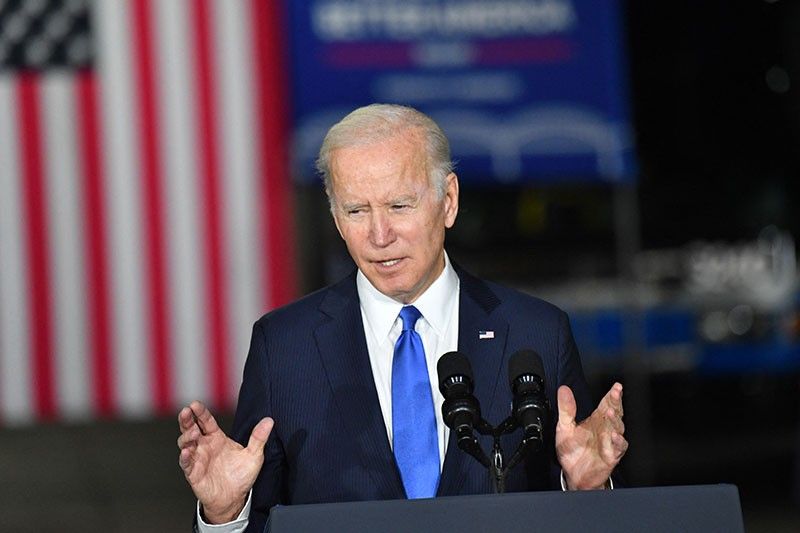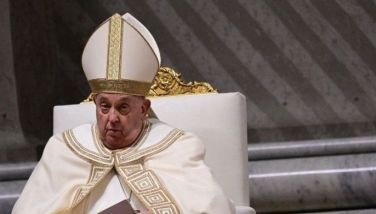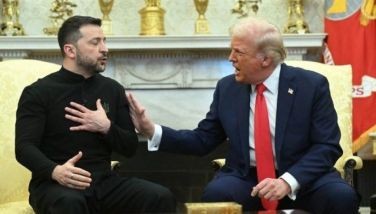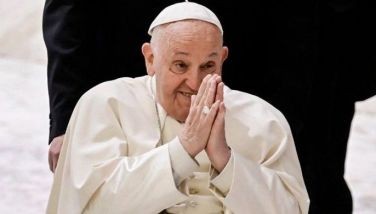Biden convenes more than 100 nations for world 'democracy' summit

WASHINGTON, United States — President Joe Biden, who took office amid the biggest US political crisis in decades, hosts representatives of more than 100 countries for a democracy summit Thursday that is drawing fire from China and Russia.
The event, held by video link because of the coronavirus pandemic, is billed by the White House as US leadership in an existential struggle between democracies and powerful autocracies or dictatorships.
"Make no mistake, we're at a moment of democratic reckoning," said Uzra Zeya, the Under Secretary of State for Civilian Security, Democracy, and Human Rights.
"It's no secret that democracies around the world are facing increasing challenges from new and novel threats. Countries in virtually every region of the world have experienced degrees of democratic backsliding."
The summit, running Thursday and Friday, will feature opening remarks from Biden at the White House and is set to gather representatives from some 100 governments, as well as NGOs, private businesses, philanthropical organizations and legislatures.
But the fact that Biden continues to face a shocking challenge to US democratic norms from Donald Trump and his attempt to overturn the 2020 election provides a troubling backdrop for the summit.
And even before summit attendees could meet, tensions erupted simply over who should be on — and off — the list.
China and Russia, which Biden sees as champions of the autocracies camp, were pointedly left out, something they say is stoking an ideological "rift."
"No country has the right to judge the world's vast and varied political landscape by a single yardstick," wrote ambassadors Anatoly Antonov of Russia and Qin Gang of China in a joint essay last month.
Further prickling Chinese sensibilities, the Biden administration has invited Taiwan — the democratically ruled island that mainland China considers part of its territory, albeit not yet under its control.
On Monday, the Biden administration also announced it would not send US government officials to the Beijing Winter Olympics in February in protest at human rights abuses, including "genocide" against the Uyghur ethnic group in Xinjiang.
Australia, Britain and Canada have joined the diplomatic boycott, although the countries' athletes will still compete. Again, Russia joined China in criticizing the decision.
Deciding when other countries should be excluded from the summit for human rights abuses or vote rigging hasn't been any less fraught.
For example, Pakistan and the Philippines are in, while EU member Hungary's nationalist government is out. Brazil's right-wing President Jair Bolsonaro is invited, while the leader of NATO member Turkey, Recep Tayyip Erdogan, has been shunned.
Democracy problem at home
The most awkward element to the summit, however, is the fact that Biden is struggling to restore faith in democracy at home, let alone on the other side of the world.
Trump refuses to recognize the results of the 2020 election, in which Biden defeated him.
With the help of sympathetic media outlets, including the powerful Fox News, the former Republican president continues to spread lies about fraud to his tens of millions of supporters.
And with shockwaves from the January 6 storming of Congress by Trump supporters still reverberating, there are growing fears over the 2022 legislative elections and the 2024 presidential vote in which Trump may seek a comeback.
Bruce Jentleson, who teaches political science at Duke University, said the summit was "never a good idea."
"Our problems here are much worse than in any other Western democracy. We had our Capitol building attacked, an attempted coup. We haven’t seen that happen in Paris, or at the Bundestag, or at the EU headquarters in Brussels," he said.
"If we want to compete, we've got to do our best and that is really more up to us within the country than somehow getting 100 leaders together and saying, 'We like democracy.'"
Joe Biden takes office as the 46th president of the United States with an optimistic call for unity, vowing to bridge deep divides and defeat domestic extremism two weeks after a violent mob tried to undo his election victory.
On a frigid but sunny day at the very Capitol building that was assaulted on January 6, Biden was sworn in moments after Kamala Harris became America's first woman vice president, closing the book on Donald Trump's tumultuous four years.
"Democracy is precious, democracy is fragile and at this hour, my friends, democracy has prevailed," Biden says before a National Mall that was virtually empty due to the ultra-tight security and a raging COVID-19 pandemic that he vowed to confront immediately. — AFP
US President Joe Biden on Thursday defends plans to extend the border wall with Mexico, saying he didn't think such barriers worked but that he was bound by laws introduced under Donald Trump.
Democrat Biden pledged during his White House race with Trump in 2020 that he would abandon the Republican's signature policy and would not build any more of the wall. — AFP
President Joe Biden admits he was concerned that US political turmoil could disrupt wartime aid for Ukraine, but says he would soon give a major speech to convince doubters on backing Kyiv.
"It does worry me," Biden says when asked whether the ousting of Republican House speaker Kevin McCarthy by hardliners in his own party could derail more funds for Ukraine's war effort.
"But I know there are a majority of members of the House and Senate of both parties who have said that they support funding Ukraine," he tells reporters at the White House. — AFP
Mexican President Andres Manuel Lopez Obrador has requested a bilateral meeting with his US counterpart to discuss the migration crisis that has "overwhelmed" his country, his foreign minister says.
The meeting would occur in Washington when Lopez Obrador attends a summit of Latin American leaders, to be convened by US President Joe Biden on November 3.
Lopez Obrador wants to discuss "legal paths" to address the humanitarian situation facing hundreds of thousands of people who have recently attempted to make their way to the United States and to study the ways in which they can request asylum, as well as work visas for the agricultural sector. — AFP
The US auto workers union expands a strike against two of Detroit's "Big Three", while President Joe Biden announces plans to join the picket line in solidarity with employees.
Some 5,600 members of the United Auto Workers union walked out of 38 US parts and distribution centers at General Motors and Stellantis at noon Friday, adding to last week's dramatic worker walkout.
The UAW has described its campaign as an effort to level the economic playing field for the working class, but Friday's events also underscored the lofty political stakes, with Biden's visit coming just a day before a planned trip by Republican rival Donald Trump. — AFP
US President Joe Biden leads international calls of solidarity with Iranians one year after Mahsa Amini's death sparked mass protests, with Western powers unveiling a series of new sanctions.
The anniversary of Amini's death in the custody of the clerical state's morality police comes as some activists criticize what they see as a return to business as usual with Tehran, which was already under a slew of sanctions.
Biden says in a statement that "today -- as we remember Mahsa's tragic death -- we reaffirm our commitment to the courageous people of Iran who are carrying on her mission." — AFP
- Latest
- Trending




























